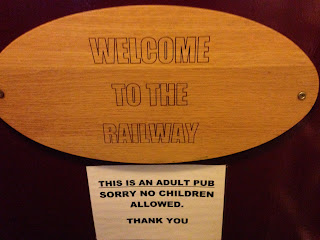Visit The Pub Curmudgeon site

The subject of children in pubs never fails to spark controversy, and there was an outbreak last week when the image shown above was widely shared on social media. Perhaps surprisingly, some of the strongest objections to this came from what might be called the “Christian Right”, with one commentator on Twitter stating: “Good luck with funding your pensions and finding someone to look after you when you're old and ill. Not sure that Fido is going to be much use then.” However, it should be pointed out that the birth rate was a lot higher in the days when children were not allowed in pubs.
Historically, under-14s were not allowed in the bars of pubs, although they could be admitted to restaurants and to physically separate “family rooms”. This was frequently ignored, but it did generally apply, and gave rise to the familiar memories of children being expected to sit outside in the car with a bottle of pop and a bag of crisps. It was undermined by the rise of dining pubs, which blurred the boundary between bar and restaurant, and in the early 1990s was abolished, leaving the admission of children up to licensees’ discretion. It should be noted that a different system applies in Scotland, where pubs and bars have to get specific permission to admit children in their licensing conditions, which is often refused for wet-led establishments.
Now, children are admitted to pretty much every food-serving pub, although a minority do require that they should actually be eating a meal. However, with wet-led pubs, the picture is more mixed, with some admitting children, but others not. Yet some people seem to raise an objection if they ever come across a pub that does not welcome their offspring. This comment on Twitter sums up the sense of entitlement of a certain category of customer, often to be found in craft bars.Earth Dad - Man. Usually wears spray on jeans and sports a beard. Common habitat is crowded pub on a Saturday aftenoon nursing half a craft beer complete with "yummy mummy" and children Jocasta and Rufus who will be loudly watching videos on their phones. Drives an SUV. Votes…
— Moriarty (@MoriartyProfJ23)
April 20, 2024
If you take your children for a meal in a pub, they are going there for a specific reason in which they can participate. However, to take them into a wet-led pub while you enjoy a drink is essentially putting yourself first and expecting them to put up with it for a while. Children spend much of their time tagging along with adult activities, but surely it is best to spend leisure time with them doing something in which they can be involved.
The advocates for children in pubs with give examples of caring, involved parents taking their children for a quick drink at the end of a shopping trip or country walk. But that is a rose-tinted view that fails to reflect the spectrum of human nature. All too often, adults are immersed in their own conversation and leave their children to their own devices. Bored, fractious children will inevitably start to behave in a manner that other customers find irritating. This is not their fault; it is that of their parents. Children are also often given electronic tablets to entertain themselves, but I really don’t want to have to sit in a pub listening to Peppa Pig videos or the bleeping of computer games.
The point is sometimes made that adults often engage in far worse behaviour than children in pubs. That is true, but it is generally recognised as being out of order and dealt with, whereas it can be very hard to draw the line with the natural exuberant behaviour of children. If licensees to raise an objection, they are likely to find themselves branded as a monster on Mumsnet. So it is hardly surprising that many, who are running pubs targeted at adult drinkers, take the view that it is much simpler to exclude children entirely rather than having to deal with them on a case-by-case basis.
I carried out a Twitter poll on the admission of children to pubs, which received an impressive 619 votes. Nearly 70% of respondents preferred the “mixed economy” solution of some pubs being child-friendly and others adults only, thereby obviously stating that they felt it was entirely legitimate for some pubs to exclude children.POLL: What would be your preferred approach to children in pubs?
A. Only admitted if eating a meal
B. Some pubs child friendly; others adults-only
C. Admitted to all pubs
— Pub Curmudgeon 🌸🍻 (@oldmudgie)
April 20, 2024POLL: What would be your preferred approach to dogs (excluding assistance dogs) in pubs?
A. Never permitted in pubs
B. Not admitted in food-serving pubs
C. Some pubs welcome dogs; others don’t
D. Admitted to all pubs
— Pub Curmudgeon 🌸🍻 (@oldmudgie)
April 21, 2024
On a related topic, I always wonder why there isn’t the same clamour to admit children to betting shops, a comparable situation of an adults-only activity where they remain strictly excluded by law. And I can’t help thinking there’s another area of human behaviour where a similar “mixed economy” approach might be beneficial to the pub trade ;-)
More...






 Reply With Quote
Reply With Quote